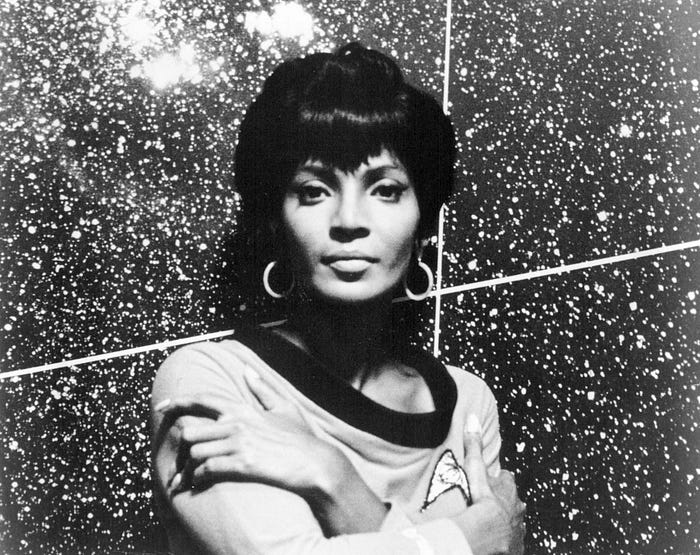

How Nichelle Nichols Kicked in Hollywood's Door With a Kiss
source link: https://aninjusticemag.com/how-nichelle-nichols-kicked-in-hollywoods-door-with-a-kiss-3088e0647616
Go to the source link to view the article. You can view the picture content, updated content and better typesetting reading experience. If the link is broken, please click the button below to view the snapshot at that time.
How Nichelle Nichols Kicked in Hollywood's Door With a Kiss
Black actors and actresses owe her Everything

Gene Rodenberry created a show in 1966 that imagined humanity as a better version of itself in the future. There was no war, poverty, money, or any of the ills that almost destroyed humankind. Instead, we made it to a more enlightened and prejudice-free existence. Of course, it was far from a utopia, but there was a sense of hope in Rodenberry's grand vision of humanity in the future.
The show was Star Trek. The cast was multicultural and groundbreaking. As a child in the 80's, I watched every episode of the show. I fell in love with it. The stories were intriguing. The planets they visited were marvelous, and they traveled on a ship that could travel faster than light. It fed my imagination and morphed me into a Trekkie. I don't attend conventions or wear the uniform, but I know most of the storylines and the show's canon. If you ever have trivia night about Star Trek, hit me up. I'm your man.
However, the primary draw for me was Lt. Nyota Uhura, played magnificently by Nichelle Nichols. Uhura was from Africa and the Chief Communications Officer for Starfleet's flagship, the USS Enterprise. She was a Black bridge officer at a time when in reality, those positions didn't exist for most African Americans and especially women. In the real military of the day, no women of color were serving in that capacity.
Yes, her position was fictional, but at that time, television roles of that type didn't exist for African Americans in Hollywood. She stood out from the pack. She made an impact.
She almost left the show after the first season, but Martin Luther King, Jr, a show fan, explained to her how important she was to television and its future. He said they saw us for the first time. She was a woman in a powerful position that would inspire generations to come. That meeting at an NAACP event changed her mind, and she went on to become one of the most beloved characters on Star Trek.
You can listen to her reminisce about the encounter below.
Nichelle Nichols remembers how Martin Luther King Jr. convinced her not to quit 'Star Trek'Star Trek icon Nichelle Nichols understood the power of fandom firsthand. After all, it was a Trek fan that convinced…
Trek icon Nichelle Nichols understood the power of fandom firsthand. After all, it was a Trek fan that convinced…
In the episode titled "Plato's Children," she and Captain Kirk were forced to kiss by aliens. It was the first time in television history two people of different races locked lips. It changed television, and Nichelle was at the forefront. She is a Civil Rights and equity pioneer when it comes to television.
In her later life, she helped recruit minorities to NASA. She encouraged Black women and men to study STEM. (Science, Technology, Engineering, and Math) Her role in a fictional series set hundreds of years into the future changed the futures of marginalized children in America. Dr. Mae Jemmison, the first African American woman in space, was inspired to become an astronaut because of Ms. Nicholls. She credits the vision of an inclusive society in the future for inspiring her to join NASA and go into space.
That is the power of inclusion in television, business, and education.
Black engineers, astronauts, and mathematicians owe Nichelle a debt that can only be repaid with continued excellence and advancement.
The character Uhura is a testament to how a singular actress changed the landscape of Hollywood.
She will be missed, but she did her work. She can rest now as we continue to reap the benefits of her 89 years on this plane of existence.
Below is a poem and a video of me reading my dedication to Nichelle.
Recommend
About Joyk
Aggregate valuable and interesting links.
Joyk means Joy of geeK